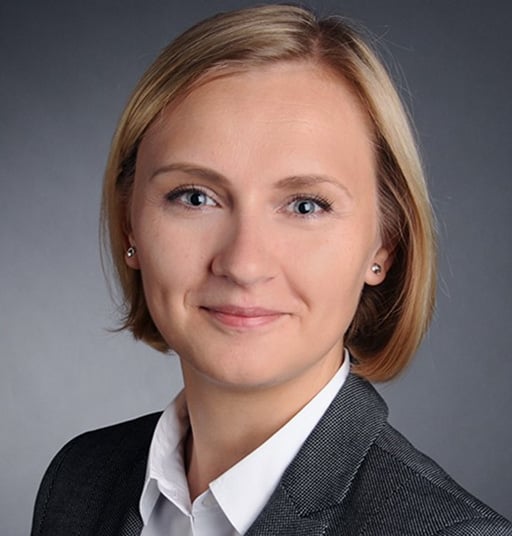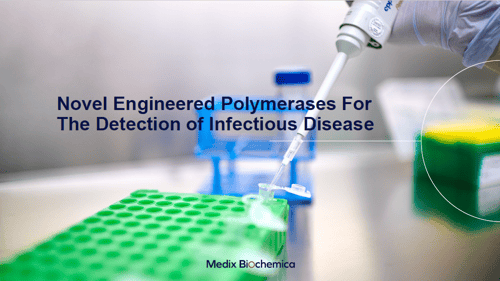MedixMDx: Engineered Polymerases | Webinar
"Novel Engineered Polymerases For The Detection Of Infectious Diseases"
Held on Wednesday, March 27, 2024, at 15:00 GMT / 16:00 CET / 10:00 EST / 7:00 PST
What's the webinar about?
In this webinar, you're able to gain a better understanding of the fundamentals of engineered polymerases and the vital role they play in infectious disease diagnostics.
Dr. Maja Studencka-Turski, scientific lead for research and development, discusses MedixMDx's specialized products that are tailored for a variety of infectious disease applications, and the enhancement of these innovations and how they bring more accuracy and speed to the detection of diseases.
This webinar is perfectly suited for researchers, healthcare practitioners, lab staff, and anyone keen on the latest developments in medical diagnostics.
If you've watched our webinar then please let us know how we did
Webinar Q&A:
1. I am interested in testing for RNA pathogens, you mentioned 2 products for this in the speech. Which one would you suggest?
This really depends on your application. Volcano was designed to:
i) Increase the specificity of primer binding
ii) Improve efficiency processing RNA templates with high secondary structure, such as viral RNA sequences
iii) Increase cDNA yields
iv) And improve efficiency on GC-rich target RNAs
So, it is optimal for a virus detection assay. The MedixMDx qRT-PCR Lyo-Ready Mix contains a "standard" reverse transcriptase. It was developed for multiplexing and is more easily integrated into established 1-step RT-qPCR workflows
2. Do you have any experience with freeze-drying Isotherm3G? I am interested in carrying out LAMP on a test cartridge and would need Isotherm3G in a lyophilized form.
We are actually working with a group right now doing something similar. We plan to release a Lyo-ready warm-start Isotherm3G master mix later this year which sounds like it would work well for your application. Otherwise, our current Isotherm3G polymerase can be customized to be Lyo-compatible, so this could also be an option if you would prefer to develop your own master mix and you are experienced with excipients. We provide lyophilization expertise and services, so please contact us for more info and we can discuss all of the customization options.
3. Could you explain a little more about the engineering part of the presentation? I am interested to know how you choose whether to go for random mutagenesis or the rational design approach.
The strategy depends on the application for which the enzyme needs to be developed. If we do not have a suitable enzyme in our stock, we would then proceed with the random mutagenesis approach. If the obtained enzyme still does not perform satisfactorily, the rational approach would be implemented (introduction of point mutations) to improve the parameters, i.e. specificity, sensitivity, etc.
4. I am based in the U.S, do you sell directly in the U.S or do you work through distributors?
In the U.S you can order off-the-shelf products directly through the Medix Biochemica website and your products will be shipped from within the U.S from our St. Louis site. We are currently working on agreements with several local distributors which we hope to announce soon. They should be able to provide better access to customers who are using purchasing platforms, such as those who work at universities. For any customization or bulk requests, we can assist you directly to coordinate shipping between sites.
5. Is PlexTaq compatible with crude samples other than blood?
Yes, PlexTaq can also be used in direct PCR with plasma and saliva as template. Furthermore, it can also be applied for food pathogen testing as it works directly with food matrix lysates.
6. When you say 20% blood in the sample, do you mean from PCR reaction volume, or how much blood & you add to your PCR mix?
PCR reaction volume, for example 4 µL of whole blood in a 20 µL PCR reaction volume.
7. Are your polymerases fast? What is the minimal anneal-extension time? What is the total time for 40 PCR cycles?
The duration required will vary depending on the product in question. For instance, when using PlexTaq for detecting foodborne pathogens, the process typically takes about 50 minutes to complete 50 cycles. A notable advantage of PlexTaq is the elimination of the initial denaturation step, allowing users to commence cycling immediately. This means there's no necessity for the conventional 2-minute or 5-minute initial denaturation stage at 95°C. Instead, one can start directly with a cycling between a 10-second denaturation phase and, for example, a 30-second annealing phase. This efficiency significantly reduces the total time required for the procedure.
Should you have any additional inquiries or need further clarification, please feel free to contact us at mdx@medixbiochemica.com
Our speakers and panelists for the webinar











